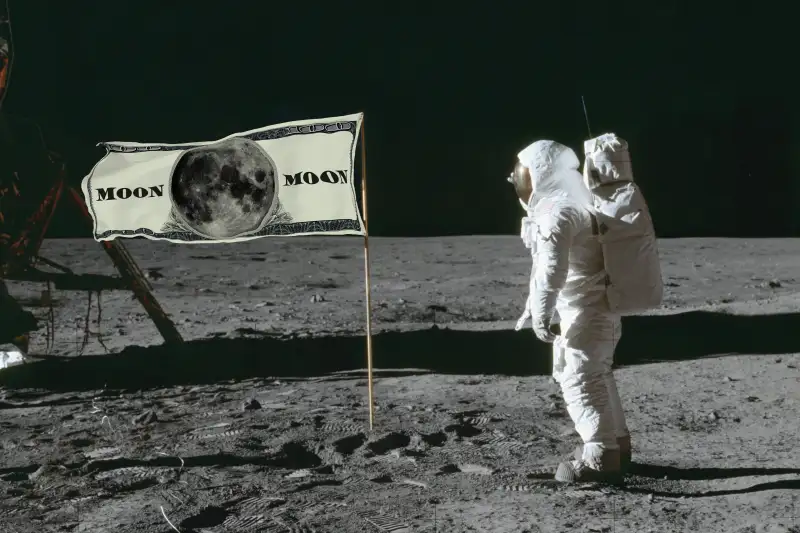What If the Moon Had Its Own Currency? The Author of 'The Martian' Has an Idea

Sci-fi books typically feature a few time-honored themes: aliens, outer space, intergalactic battles where the future of the universe hangs on a hero or heroine. For Andy Weir, the author behind the best-selling novel The Martian, money is front-and-center in his new book, Artemis.
Weir actually created a new digital currency he calls "soft landed grams," or "slugs," which helps drive much of the plot of Artemis. The book's main character is Jazz Bashara, a smart resident of the lunar community who is also a small-time criminal caught up in a scheme to pull off the perfect financial space crime. The lunar city is called Artemis and is a multicultural hub owned by a Kenyan company, with residents coming from every corner of the globe to populate it. But with such diversity, there needed to be a monetary system that reflected that—as well as the challenges of getting goods to the moon. So Weir based his currency on the weight of an item and the related cost of transportation.
Money sat down with Weir this week to find out how he created his lunar currency and how he thinks of his own money here on earth.
Your new book Artemis is a heist novel with a lot of economics involved…
I put a lot of effort into the economics. I’m way more interested in economics than my readers are.
The book is set on the moon. And so you had to figure out how to pay for everything…
Yes, slugs.
We’re all a little obsessed with digital currencies right now, especially with Bitcoin and cryptocurrency in the news.
Well, it’s not a cryptocurrency, it’s a reserve currency.
Why did you go that route?
Well, Artemis is this intensely international community— so what would they use? Maybe dollars, euros yen? At first, I thought, well, they’d probably settle on dollars, honestly. But then I thought, well, it’s a Kenyan company that owns it, so maybe they’d use Kenyan dollars. Eh, no. But for a population of 2,000, a [traditional] currency doesn’t make any sense. It was a real problem for me. Eventually I realized I was just doing the math in terms of grams—and I’m like, there’s your answer. Soft landed grams—slugs. It’s basically store credit with the Kenya Space Corporation that could be traded.
You have one corporation in charge of the money flow, right?
Yes, but each of the entities that buy and sell goods within Artemis are completely independent. So KSC would not be able to exercise too much control over that economy. Because if they did anything that people didn’t like, they’d just be like, “Fine, I’m going to use euros.”
It’s easy to give money to the Kenya Space Corporation and they’ll keep an account balance for you. It’s a non-shadow, shadow banking system. The opposite of a sunlight banking system—a moonlight banking system. That’s when I started to think about all the cool stuff—cool from a nerd perspective—that happens. It’s this completely unregulated currency, so, first off, money laundering.
You self-published The Martian before the signing with Crown Books. When did you feel you started making a livable income off your writing?
At no point did I ever take a financial risk. I was making a good salary as an engineer, and I didn’t quit my engineering job until I got an advance for my next book, after The Martian—which at the time was going to be Zhek, but that contract became Artemis. But I’m super risk averse when it comes to money. My IRA money is effectively sitting in cash.
No!
Well, not cash cash.
Nothing? Like a Vanguard target date fund?
Well, a SEP IRA. CDs are about as exciting as I want to get in investment. I’m super risk adverse.
Why? What’s the biggest money mistake you’ve ever made?
After I left AOL—so it’s like 1999—I ended up getting about $1 million in stock options. Well, pre-tax. So I paid my taxes and I put the rest of it into slow-growth mutual funds, really, really conservative, safe mutual funds. And then the tech bubble collapsed and it turned out that those allegedly safe were just riddled with tech and just dragged everything straight to hell. So I’d say the biggest mistake I made was not paying enough attention to the allegedly safe mutual funds. I should’ve checked the actual stocks in there.
Do you do that now?
I don’t do mutual funds at all now. Right now, I’m just sitting on it in CDs—temporarily. A big chunk of my money just went into my house. I bought outright, a house in Silicon Valley. It's very expensive. When I’m buying property, I’m not interested if the value goes up and down because my theory is to never sell property unless you need the money for something.
What’s the best money you’ve spent—on earth?
It’s a boring answer, but I still live way within my means. So I got a bunch of money that came in through The Martian, so I got a very large increase—a 10x annual income.
You didn’t buy yourself anything after The Martian?
I bought a shergottite, which is a meteorite that landed on Mars. It’s one of only 50 or so known to exist. It cost me $10,000. It’s about the size of a walnut. It’s on a little display case on my mantle.
Artemis is out now in bookstores and an audiobook version (performed by actress Rosario Dawson) is available through Audible.
We’ve included affiliate links in this article. Click here to learn what those are.